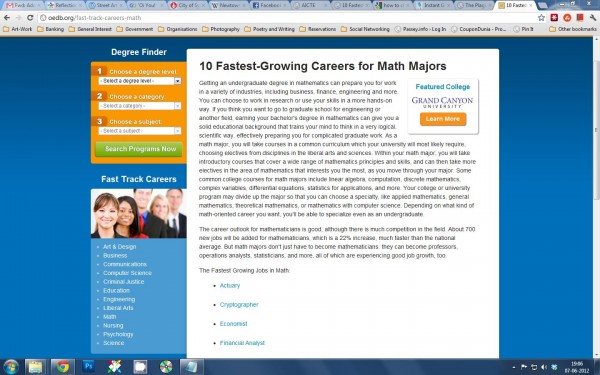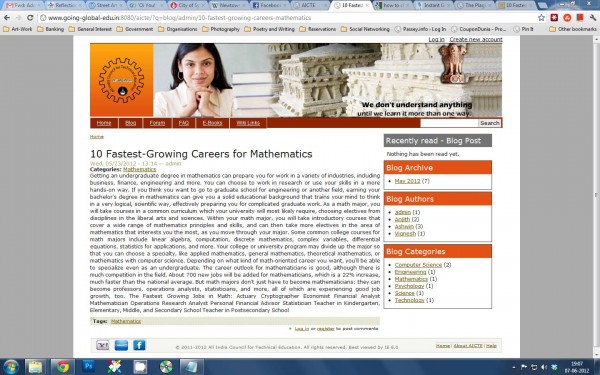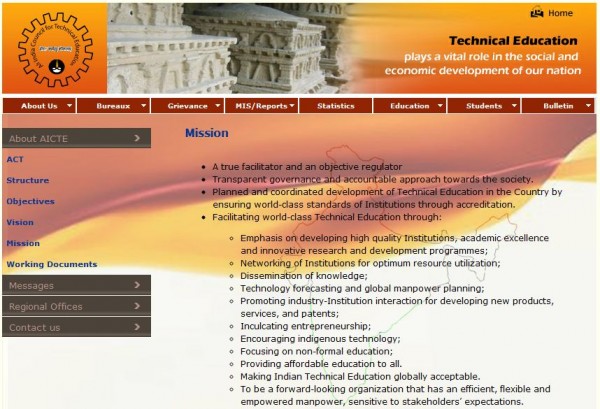AICTE or All India Council for Technical Education wants everyone to hold it and its policies in great esteem. For one of my blog posts I wanted some information that I thought could be had from the AICTE website… good that I decided to surf around that site because I stumbled on to texts that are nothing but blatant examples of bare-chested plagiarism!
Yes, AICTE is nothing better than a lowly plagiarist… which obviously points to the people who manage the organisation. The copy-paste text thinking no one will ever detect. Is plagiarism the path that AICTE wants to take to fulfil their vision ‘to be a world class organization leading technological and socioeconomic development of the Country by enhancing the global competitiveness of technical manpower and by ensuring high quality technical education to all sections of the society?’ I was shocked to see the extent to which the AICTE experts have copied text… they have even mentioned statistics and figures that I’m sure have absolutely no relevance from the Indian point of view.
Let me first prove my point with these two images…
This image is of the AICTE page on higher mathematics.
This image is of the website from where the text has been copied. It was quite simple to detect this as the net gives you a lot of tools to find out instances of plagiarism.
For the uninitiated, let me first give the definition of plagiarism. Wikipedia writes that ‘though plagiarism in some contexts is considered theft or stealing, it does not exist in a legal sense. Plagiarism is not mentioned in any current statute, either criminal or civil. Some cases may be treated as unfair competition or a violation of the doctrine of moral rights. The increased availability of intellectual property due to a rise in technology has furthered the debate as to whether copyright offences are criminal.[citation needed] In short, people are asked to use the guideline, …if you did not write it yourself, you must give credit.’ The website goes on to elaborate by writing that ‘Plagiarism is defined in dictionaries as the wrongful appropriation, close imitation, or purloining and publication of another author’s language, thoughts, ideas, or expressions, and the representation of them as one’s own original work, but the notion remains problematic with nebulous boundaries. The modern concept of plagiarism as immoral and originality as an ideal emerged in Europe only in the 18th century, particularly with the Romantic movement, while in the previous centuries authors and artists were encouraged to “copy the masters as closely as possible” and avoid unnecessary invention.’
In their Mission Statement on their website, AICTE claims that they are ‘accountable approach towards the society’, that they will be ‘facilitating world-class Technical Education’, that they will promote ‘academic excellence and innovative research’, and quite importantly, they will aim to ‘be a forward-looking organization that has an efficient, flexible and empowered manpower.’ All this is a part of their Mission Statement that you can read in the image reproduced below:
Is plagiarism really an ‘accountable approach towards society’? Is copying text anyway going to help them ‘facilitate world-class technical education’ or lead us all towards ‘academic excellence’? If plagiarism is their way of ‘innovative research’, then God save us! I’d surely love to know what sort of ‘efficient… and empowered manpower’ AICTE has. Yes, they do seem quite ‘flexible’ when it comes to the dare-devilry of presenting texts that are copied and figures that are irrelevant!
Aren’t the AICTE honchos aware that plagiarism or ‘copyright infringement is a cognizable offence’? K R Rao in his article ‘Plagiarism, a scourge’ writes that the only way out is the ‘fair use doc-trine, which allows quoting brief passages from a copy-righted book without explicit permission to do so.’
I sincerely hope that someone from AICTE will read this blog post and make sure that the intelligent team sitting there framing education policies gets more sensitised towards the ethical principles of content creation. They must know that they need to cite quotes or ideas, enclose copied text in quotes, or re-write content in their own words… and if they just lift entire passages of text without even acknowledging the source or taking permission from the source, they surely will lose the right to call themselves the leaders who want to be followed!
Arvind Passey
07 June 2012












6 comments
Jayant Bharadwaj(sagar) says:
Jun 7, 2012
hahahahahhahahaha Indian are damn gud in it since stone age…
Arvind Passey says:
Jun 8, 2012
Don’t say: ‘Indians are good at plagiarism’… because it is only a few people who get sucked into this vortex of easy work. It is the shirkers, the procrastinators, the undeserving, and the untalented who take the easy way out of writing original text. It is such people and organisations that encourage such acts that need to be castigated.
shooting star says:
Jun 12, 2012
sometimes i wonder if the bureaucracy (and indeed AICTE is part of that) is composed for dimwits….I live in a neighbourhood of civil servants(though im of the view, they are neither civil nor servants to anyone!!)….and i see such low quality of individuals, in terms of intellectualism and professionalism..as if they are just only interested in the free car, peons, sevaks, govt accommodation…and that they have managed to get in the system…they care two hoots about work!!!
http://sushmita-smile.blogspot.in/
Arvind Passey says:
Jun 12, 2012
So true, Sushmita… so it is good to point out flaws hoping they will read about them and correct them some day. After all, we humans need to keep on ‘evolving’ into better beings! 🙂
Abhishek Agrawal says:
Jun 21, 2012
Such horrors exist! I am feeling now pretty low as am a AICTE student :\ I did knew about those fake figures they pretend to have obtained by actual survey..but I never imagined or thought of this blatant copy-paste work they would dare to do so on their own public website! >.< Really a shame!
Arvind Passey says:
Jun 22, 2012
Yes, such horrors do exist… right under our noses! Isn’t it time that these big education propagators woke up and began by cleaning up their own house?